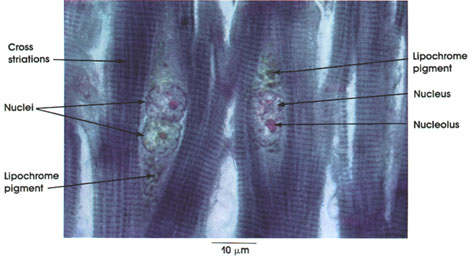

Lipochrome pigment
Ronald A. Bergman, Ph.D., Adel K. Afifi, M.D., Paul M. Heidger,
Jr., Ph.D.
Peer Review Status: Externally Peer Reviewed

Human, Helly's fluid, Mallory's stain, 1416 x.
Several branching cardiac muscle fibers are seen in this plate. Note the transverse striations characteristic of cardiac and skeletal muscle fibers. Two ovoid nuclei are seen in one fiber and are always centrally located. Nuclei are oriented in the long axis of the fiber and contain prominent nucleoli. Binucleate fibers are seen only occasionally in cardiac muscle. Adjacent to the nuclei, note the greenish-black granules of lipochrome pigment. This pigment increases with age and is thought to be a product of normal metabolic activity. See also Plate 13.
Next Page | Previous Page | Section Top | Title Page
Please send us comments by filling out our Comment Form.
All contents copyright © 1995-2024 the Author(s) and Michael P. D'Alessandro, M.D. All rights reserved.
"Anatomy Atlases", the Anatomy Atlases logo, and "A digital library of anatomy information" are all Trademarks of Michael P. D'Alessandro, M.D.
Anatomy Atlases is funded in whole by Michael P. D'Alessandro, M.D. Advertising is not accepted.
Your personal information remains confidential and is not sold, leased, or given to any third party be they reliable or not.
The information contained in Anatomy Atlases is not a substitute for the medical care and advice of your physician. There may be variations in treatment that your physician may recommend based on individual facts and circumstances.
URL: http://www.anatomyatlases.org/